The XR Lab purpose is to advance the study and design innovation with emerging technologies in the areas of virtual, augmented, mixed reality and AI. The Innovation Center is home of the XR, AI and Quantum Labs.
FOUR BUILDING BLOCKS
IMMERSIVE LEARNING
A resource hub for inspiring XR initiatives within the university with the focus on developing new learning models, design, storytelling, performing arts and the future of learning.
XR and HCI LABS
Learn, design and experience what immersive worlds, XR and Human Computer Interaction (HCI) interfaces offer through our workshops, events, virtual and lab environments.
RESEARCH
Lead and conduct research to create new knowledge and better understand the efficacy and impact of immersive and emerging technology in education and across industries.
PARTNERSHIPS
Develop XR projects and products with internal and external clients and partners.

Maya Georgieva, Senior Director, Innovation Center, XR, AI and Quantum Labs
Maya Georgieva is a futurist, XR strategist, immersive storyteller, and producer, as well as a sought-after keynote speaker on the future of immersive learning and innovation in creative industries. As the founding Senior Director of the XReality Center and today the Innovation Center and XR, AI, and Quantum Labs at The New School, she provides strategic leadership in advancing institutional capacity for emerging technologies, including spatial computing, generative AI, and quantum computing. Maya also teaches the signature Immersive Storytelling course at Parsons School of Design, guiding over 100 emerging artists.
Her work has been featured at SXSW, the MIT Media Lab, The Atlantic, The Economist, and the Fulbright Program. She is an Innovator in Residence at ShapingEDU, Arizona State University, and co-author of the State of XR and Immersive Learning report. Additionally, she co-authored the pioneering EDUCAUSE series VR and AR: Stepping into the New Frontier of Learning and has contributed white papers on the future of higher education and immersive learning.
Maya has served as a final judge at the MIT Reality Hack and AI for Filmmaking Hackathons. At SIGGRAPH 2023, she collaborated with Sony Visiting Scholar Keijiro Nagano on The Talk: Speculative Conversation with Everyday Objects, an interactive installation and paper incorporating Augmented Reality and Generative AI. She was also instrumental in launching Speculative Cultures: A Virtual Reality Exhibition at Parsons’ Sheila Johnson Design Center in early 2019, one of the first gallery exhibitions to integrate VR headsets.
As co-founder of Digital Bodies, an award-winning platform exploring VR/AR/MR and their impact on media and society, Maya has facilitated master classes and talks on immersive storytelling, new media narratives, innovation in higher education, and the future of learning. She has collaborated with Google, HP, Microsoft, Intel, Salesforce, and Meta, as well as education and nonprofit organizations, to develop immersive experiences, digital strategies, and innovation initiatives.
A sought-after speaker, Maya has presented at global events, including SXSW, UNESCO, The Milken Institute Global Conference, and United Nations and European Commission forums, where she has contributed to policy recommendations on the ethics of XR, AI, and the future of learning and work.
Email: Maya@newschool.edu
